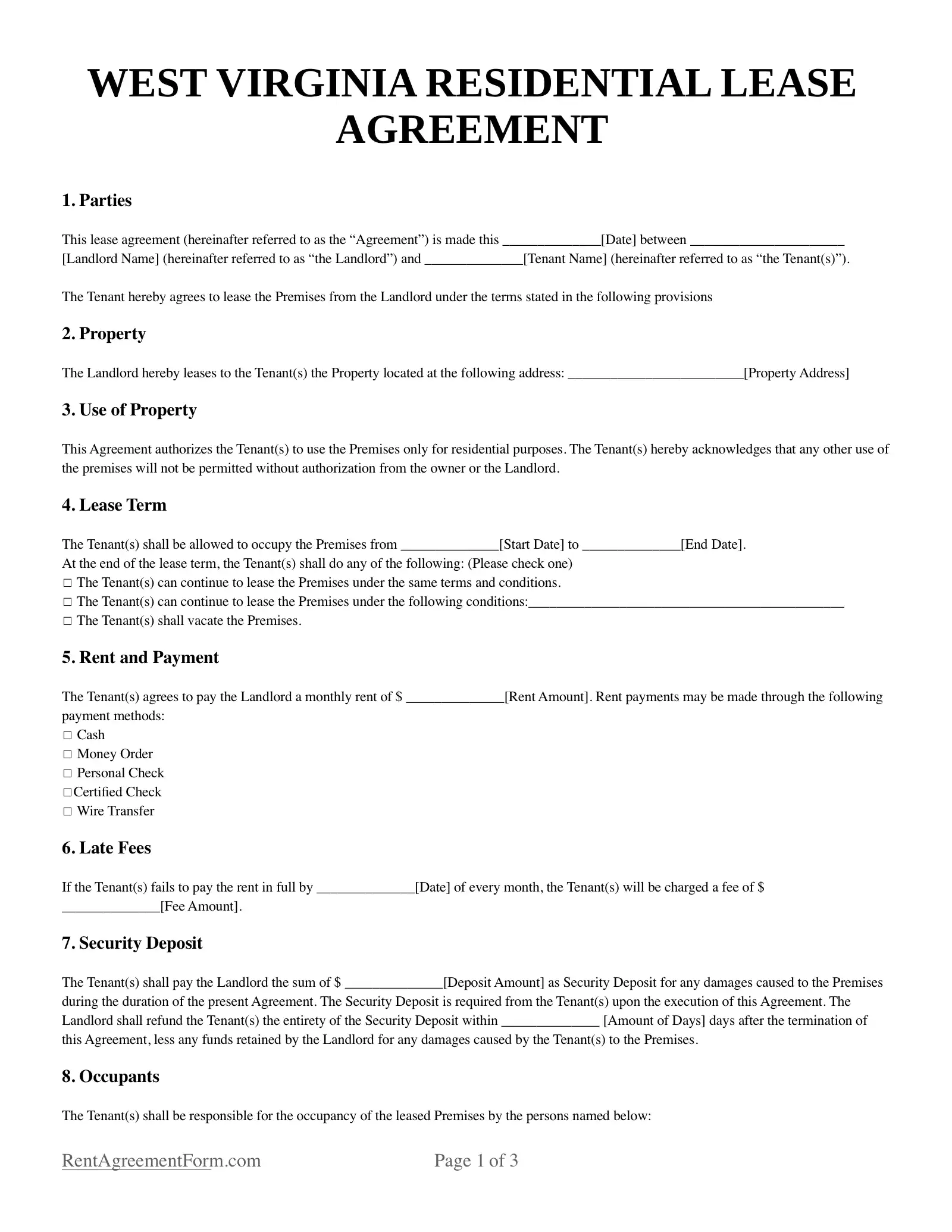West Virginia Residential Lease Agreement Form
A West Virginia residential lease agreement form is a document that binds a landlord and tenant over the rental of a property. It is a contract that both parties must uphold throughout the term. A written and signed lease agreement is the best way to prevent conflicts and disputes in the future. Before a lease is discussed and signed, the tenant may need to submit a West Virginia rental application form to ensure they meet the necessary qualifications before moving forward. If the landlord is satisfied with the applicant following a background check, the application is approved. Both parties can proceed to deliberate on the terms of the lease.
The standard West Virginia residential lease agreement form contains a brief description of the real estate: size, number of rooms, and address. It also outlines all the occupants of the property, including pets.
Further, the printable document lists all the responsibilities of each party. For example, the landlord must ensure every room in the rental property is safe for occupation. On the other hand, the renter or tenant must maintain the condition of the property from the moment they move in. The tenant must pay rent on time, usually on the first day of the month, unless agreed otherwise.
Read on to learn more about the West Virginia residential lease agreement form.

Required Disclosures for West Virginia Residential Lease Agreements
- Lead-Based Paint Disclosure - Realtors and landlords are obliged to disclose to tenants if the property was built before 1978. This is because lead-based paint may have been used in the structure. Landlords are also duty-bound to provide educational materials about the dangers of lead-based paint (Lead-Based Paint Hazard Reduction Act of 1992 § 1018).
- Non-Refundable Fees - All non-refundable fees must be noted in the fillable lease agreement form. Non-refundable fees refer to the application fee, which is collected before the lease is signed, and the pet fee, which is a form of security deposit for tenants with pets that may cause damage to the property (WV Code § 37-6A-1).
Rent Grace Period in West Virginia
No law or statute determines the rent grace period in West Virginia. This means that if the tenant fails to pay the rent day it is due, they may receive immediate notice to quit from the landlord. This notice informs the tenant they will be removed from the property.
Security Deposits
There is no cap on the amount a West Virginia landlord can collect as a security deposit.
Unlike the rental application fee, the security deposit is refundable. The landlord has 60 days to return the security deposit to the tenant from the termination of the tenancy. If a new tenant is renting the property, the landlord must return the security deposit to the previous tenant within 45 days.
The landlord may deduct a certain amount from the security deposit before turning it over to the tenant. Some of the permitted deductions are unpaid rent, damage to the property incurred due to non-compliance with the rental agreement, expenses for the removal and storage of items left behind by the tenant, among others. Security deposit details are usually included on a lease agreement, and may also be included on a West Virginia rental application.
In cases of serious damage or break in the property and the amount needed for repair exceeds the security deposit, West Virginia law states: “The landlord shall give written notice to the tenant, advising them of that fact, within the applicable notice period. If notice is given as prescribed in this subsection, the landlord shall have an additional 15-day period to provide an itemization of the damages and the cost of repair” (WV Code § 37-6A-2c).